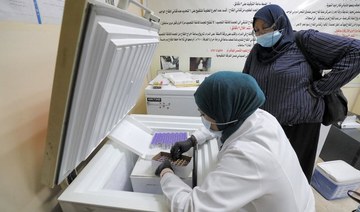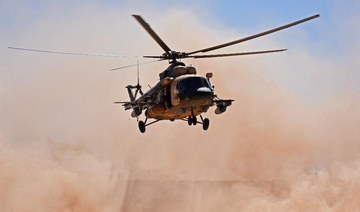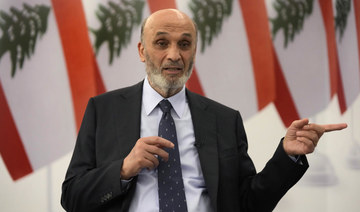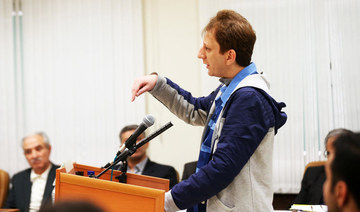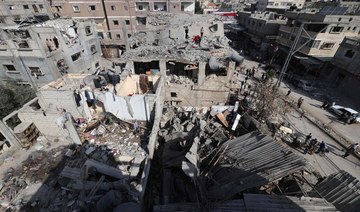BAGHDAD: A soldier exposes his shoulder and awaits a jab to the amusement of fellow troops, a familiar scene in Iraq where a Covid spike is prompting more vaccinations despite widespread hesitancy.
At a Baghdad hospital administering the Pfizer/BioNTech jab, chaos reigns as dozens of men and women of all ages stream into an inoculation center where doctors are unaccustomed to seeing such crowds.
An elderly man shuts his eyes as the needle approaches, a young woman poses for her friends, and patients emerge from a room clutching certificates and looking relieved.
“In the last 10 days, the number of (vaccination) patients has risen to 600 or 700 people a day” compared with 200 to 400 previously, says Dr. Abbas Mohammed.
“The increase in the number of infections and deaths is really starting to scare people,” he says.
This week Iraq reported 12,000 new infections in 24 hours, a milestone previously unreached since the pandemic hit in March last year.
On Wednesday, a new daily high was reached with 13,515 cases. The government is ramping up warnings and incentives for people to get vaccinated as well as to comply better with poorly followed health protocols.
“Up until now, I was afraid (of vaccination), but the worsening of the situation has convinced me,” says Ali, a young man now “very excited” about getting his first dose.
The wait can last several hours, says 50-year-old Adnan Abdelhamid, bemoaning the “lack of organization” and “the people who know someone and go before the others.”
But the majority of patients are satisfied, like Salima Mehdi, an elderly woman whose head is veiled by a chequered scarf.
“I am so happy to be vaccinated, thank God,” she says, her eyes gleaming behind her facemask.
Dr. Mohammed says the number of people vaccinated in the country each day has risen from 23,000 to 110,000 of late.
And despite the blazing summer heat, queues are getting longer in front of vaccination centers in the capital, in the eastern province of Wasit and in Iraqi Kurdistan to the north.
The number of people to have received two doses reached 1.5 million this week in Iraq, a country with a 40-million strong population and where distrust of vaccines has been particularly strong.
“There is a jump in the rate of vaccination in all provinces,” health ministry spokesman Saif Al-Badr told AFP.
Fifty-year-old Ali admits he has long been afraid of the side effects of vaccines, an anxiety fueled by misinformation, including from health professionals.
“But more and more doctors on TV are explaining why you should get vaccinated. We also see people around us leaving. So I took the plunge,” he says, although the rest of his family have yet to decide.
“They are waiting to see; I am their guinea pig,” he says with a loud laugh.
A doctor at a private clinic says his patients prefer to get treated for Covid rather than get vaccinated.
“Too many people still don’t realize the importance of the vaccine and preventive measures,” says the doctor who requested anonymity.
But “opinions change easily in the face of the gravity of the situation,” he adds, and notes that the recent growing awareness is a “very good thing.”
Iraq launched its inoculation campaign in March and uses the Pfizer/BioNTech, AstraZeneca and Sinopharm vaccines.
On a visit to Washington this week, Iraqi Prime Minister Mustafa Al-Kadhemi said some 500,000 doses of the Pfizer/BioNTech vaccine were to be delivered in the coming weeks.
More than 18,000 people have officially died of Covid in Iraq in the past 18 months, and the country has recorded nearly 1.6 million cases of infection.
In Iraq, vaccine hesitancy gives way to jabs as Covid spikes
https://arab.news/8sc2b
In Iraq, vaccine hesitancy gives way to jabs as Covid spikes
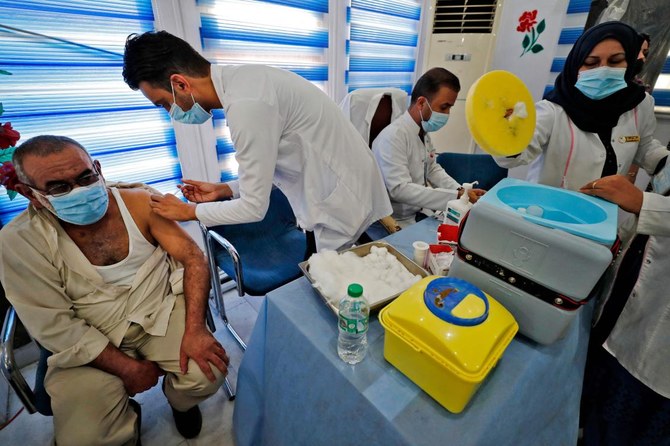
- "In the last 10 days, the number of (vaccination) patients has risen to 600 or 700 people a day" compared with 200 to 400 previously
- This week Iraq reported 12,000 new infections in 24 hours, a milestone previously unreached since the pandemic hit in March last year
UAE FM discusses Gaza with Israel’s opposition leader
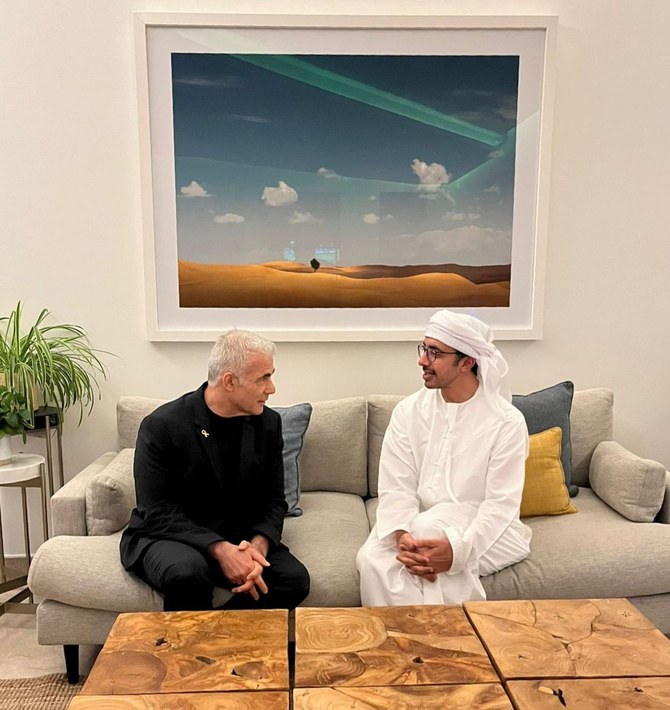
- Sheikh Abdullah stressed the need to restart talks on the two-state solution in Palestine
ABU DHABI: The UAE’s Foreign Minister Sheikh Abdullah bin Zayed Al-Nahyan held discussions on developments in Gaza with Israel’s opposition leader Yair Lapid in Abu Dhabi recently, Emirates News Agency reported on Thursday.
During the meeting, Sheikh Abdullah stressed the need to restart talks on the two-state solution in Palestine, which he said would ensure permanent regional peace and security.
He called for additional efforts to reach an immediate ceasefire in Gaza, which would prevent the conflict spreading to the rest of the region.
Sheikh Abdullah added that it was important for aid to reach Gaza, and that the lives of civilians should be protected.
Palestinian security force kills Islamic Jihad gunman in rare internal clash
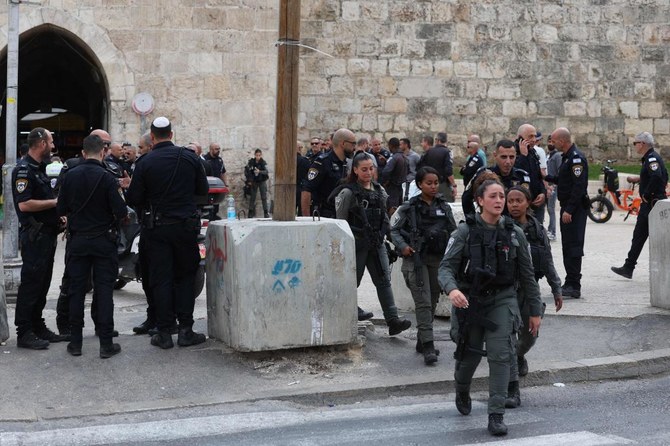
- Al-Foul was “treacherously ... targeted in his car” without provocation, the brigades said in a statement. “This crime is just like any assassination by Israeli special forces.”
RAMALLAH: Palestinian security officers killed a gunman in the occupied West Bank on Thursday, a rare intra-Palestinian clash whose circumstances were disputed and which the fighter’s faction described as an Israeli-style “assassination”.
Palestinian Authority security services spokesperson Talak Dweikat said a force sent to patrol Tulkarm overnight came under fire and shot back, hitting the gunman. He died from his wounds in hospital.
Videos circulated online, and which Reuters was not immediately able to confirm, showed a car being hit by gunfire.
A local armed group, the Tulkarm and Nour Shams Camp Brigades, claimed the dead man, Ahmed Abu Al-Foul, as its member with affiliation to the largely militant group Islamic Jihad.
Al-Foul was “treacherously ... targeted in his car” without provocation, the brigades said in a statement. “This crime is just like any assassination by Israeli special forces.”
President Mahmoud Abbas’ PA wields limited self-rule in the West Bank, and sometimes coordinates security with Israel.
Parts of the territory have drifted into chaos and poverty, with the PA and Israel trading blame, especially since ties have been further strained by Israel’s offensive in Gaza.
Hamas, an Islamic Jihad ally which rules the Gaza Strip and has chafed at Abbas’ strategy of seeking diplomatic accommodation with Israel, denounced “the attacks by the PA’s security forces on our people and our resistance fighters”.
Palestinian security forces and gunmen have exchanged gunfire several times in the last year, but deaths are rare.
EU offers 1 bln euros in economic, security support to Lebanon
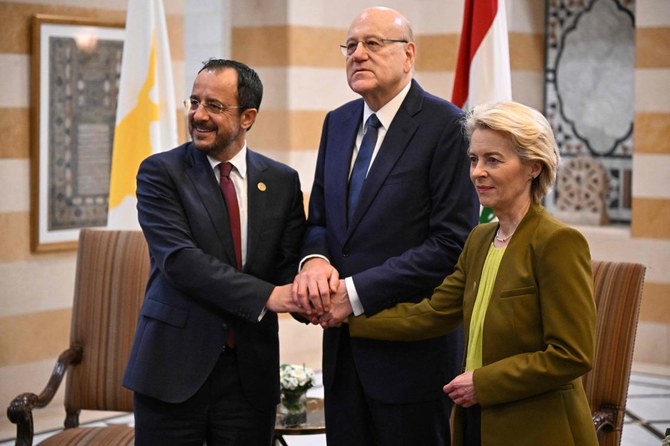
- The funds would be available from this year until 2027
BEIRUT: The European Union has offered Lebanon a financial package of 1 billion euros ($1.07 billion) to support its faltering economy and its security forces, European Commission President Ursula von der Leyen said on Thursday during a visit to Beirut.
Von der Leyen said the support package would help bolster basic services in Lebanon, including health and education, though she added that it was crucial for Beirut to “take forward economic, financial and banking reforms” to revitalize the business environment and banking sector.
Speaking alongside Lebanon’s Prime Minister Najib Mikati and Cypriot President Nikos Christodoulides, she said security support to the Lebanese army, the internal security forces and General Security would be focused on providing training, equipment and infrastructure to improve border management.
Lebanon’s economy began to unravel in 2019 after decades of profligate spending and corruption. However, vested interests in the ruling elite have stalled financial reforms that would grant Lebanon access to a $3 billion aid package from the International Monetary Fund.
As the crisis has been allowed to fester, most Lebanese have been locked out of their bank savings, the local currency has collapsed and public institutions — from schools to the army — have struggled to keep functioning.
In parallel, Lebanon has seen a rise in migrant boats taking off from its shores and heading to Europe – with nearby Cyprus and increasingly Italy, too, as the main destinations, researchers say.
Iran slaps sanctions on US, UK over Israel support
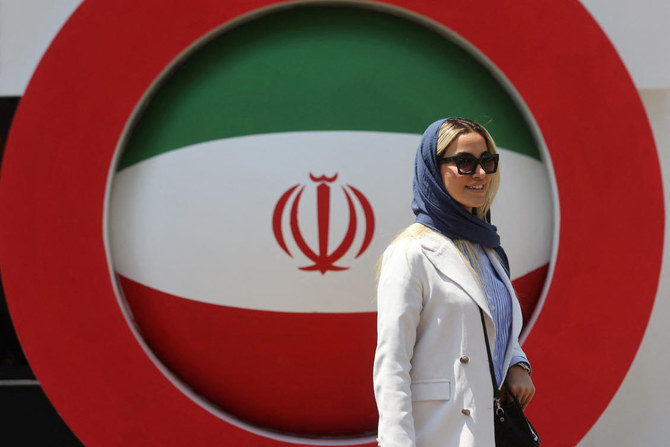
- Sanctions targeted seven Americans
- British officials and entities targeted include Secretary of State for Defense Grant Shapps
TEHRAN: Iran announced on Thursday sanctions on several American and British individuals and entities for supporting Israel in its war against the Palestinian militant group Hamas.
The Islamic republic, the regional arch-foe of Israel, unveiled the punitive measures in a statement from its foreign ministry.
It said the sanctions targeted seven Americans, including General Bryan P. Fenton, commander of the US special operations command, and Vice Admiral Brad Cooper, a former commander of the US Navy’s Fifth Fleet.
British officials and entities targeted include Secretary of State for Defense Grant Shapps, commander of the British army strategic command James Hockenhull and the UK Royal Navy in the Red Sea.
Penalties were also announced against US firms Lockheed Martin and Chevron and British counterparts Elbit Systems, Parker Meggitt and Rafael UK.
The ministry said the sanctions include “blocking of accounts and transactions in the Iranian financial and banking systems, blocking of assets within the jurisdiction of the Islamic Republic of Iran as well as prohibition of visa issuance and entry to the Iranian territory.”
The impact of these measures on the individuals or entities, as well as their assets or dealings with Iran, remains unclear.
The war in the Gaza Strip erupted after the October 7 attack by Palestinian militants on Israel which killed 1,170 people, mostly civilians, according an AFP tally based on official Israeli figures.
Iran backs Hamas but has denied any direct involvement in the attack.
Israel’s retaliatory offensive against Hamas has since killed at least 34,568 people in Gaza, mostly women and children, according to the Hamas-run territory’s health ministry.
12-truck UAE aid convoy enters Gaza Strip

- UAE has also sent Palestinians food, water via sea, air
- Emirates has provided medical treatment for thousands
Al-ARISH: A UAE aid convoy entered the Gaza Strip on Wednesday via Egypt’s Rafah Crossing Point as a part of the country’s “Operation Chivalrous Knight 3” project to support the Palestinian people, UAE state news agency WAM reported on Thursday.
The 12-truck convoy is transporting over 264 tonnes of humanitarian aid including food, water and dates.
The latest convoy now brings to 440 the number of trucks that have been used for support efforts.
As of May 1, 2024, the UAE has now provided the Palestinians 22,436 tonnes of aid, which has included the deployment of 220 cargo planes and three cargo ships. The goods pass through Al-Arish Port and the Rafah crossing into Gaza.
These efforts are a part of the “Birds of Goodness” operation, which involves aerial drops of humanitarian supplies. By Wednesday, 43 drops have been conducted, delivering a total of 3,000 tonnes of food and relief materials to inaccessible and isolated areas in Gaza.
Since its establishment, medical staffers at the UAE’s field hospital in Gaza have treated more than 18,970 patients. An additional 152 patients were evacuated to the UAE’s Floating Hospital in Al-Arish Port, and 166 to the UAE for treatment.
The UAE has set up six desalination plants with a production capacity of 1.2 million gallons per day to support the people in Gaza.



